#writing tool
Explore tagged Tumblr posts
Text
Always

#writing#writers on tumblr#writing prompt#writers#writer#my writing#daily writing prompt#daily writing#story#writing tool#write it
35K notes
·
View notes
Text
Character Building
Some things to think about when building/describing a character:

Physical traits
Hair: color and length. Maybe it's natural, maybe it's dyed
Build: height, weight, muscle
Face: maybe they have a longer nose or forehead. Think about specific features like freckles, gapped teeth, jaw shape, acne scars, lip shape
Eyes: eye color, shape,
Backstory
Where is your character from?
Do they have family? How has that affected their personality?
What are their goals?
What are their likes/dislikes?
Strengths and weaknesses
Age
Personality
Voice: is their voice deep? Lilted? Strained?
How do they react to stressful situations?
What do they wear?
Are they kind? Meaner? Restrained?
How do they move? If they're older maybe they're a bit slower. Maybe your character is clumsy or move awkwardly
Body language/face: is your character normally more serious? Do they have RBF? Maybe they smile more or their face is more relaxed at rest. Maybe they leave their hands on their hips a lot, or prefer them crossed or in their pockets.
How are they perceived by others? How do they view the people around them?
Should I dive deeper on some of these?
#creative writing#my writing#short story#snippet#story#writers on tumblr#writers community#writing#writeblr#writers and poets#prompt list#prose#writing prompt#words#character design#aspiring writer#aspiring author#writerscommunity#character description#writing tips#writing things#writing tool#writing advice#writing and poetry
3K notes
·
View notes
Text
Writing Tools for Planning Your Story
I've tried tons of writing apps and sites, so you don't have to. Here's a list of free sites to plot out your novel, with my review and some images of how I use it.
Milanote
Milanote is like having a giant pinboard with folders. You can upload anything onto it [yes even your main doc] and then draw over it or connect things with lines and arrows
Milanote lets you add up to a hundred things for free, not including drawing. This is one of the downsides of the site as I've found myself reaching that limit recently.
For me, the best part is being able to draw over stuff, and the color swatches.
Milanote is a lot less structured than other sites I've used, and personally, I don't think their templates are worth using.
8/10 overall, Milanote is what I mainly use. Here are some pics of how I use it:
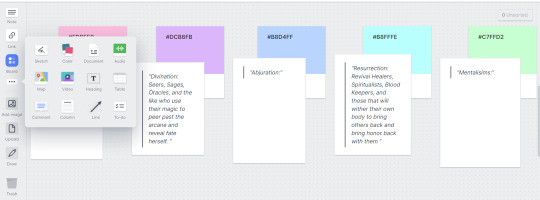
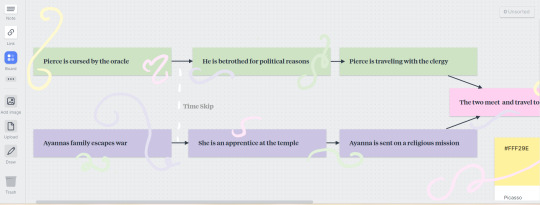
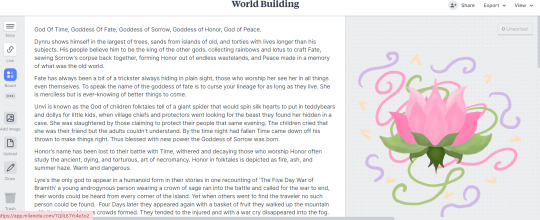
Miro
Miro is a flowchart website mainly used for corporate jobs, however, it can be a great plotting tool for that reason
Miro has a lot of great starter templates if you are looking for a more structured freeform experience. It also comes with a blank page as well.
Unfortunately, I'd argue that it's a bit of a hard tool for beginners to use without a template, I've learned copy-paste is my best friend with Miro the hard way.
It's much better than most platforms at making timelines though.
It has a limit of three boards which is a bit disappointing but overall, I think it's worth the try.
5/10 Miro is very middle of the road for me due to the limited ability to customize things and the free limit. Here are some pics:
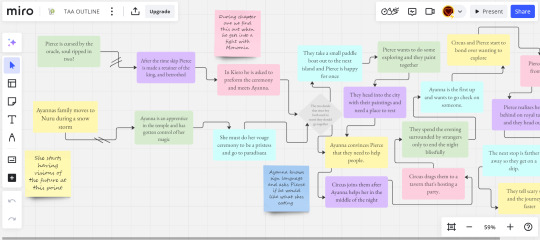
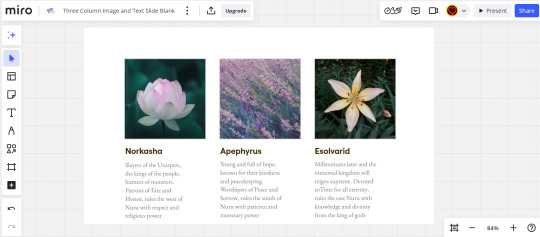
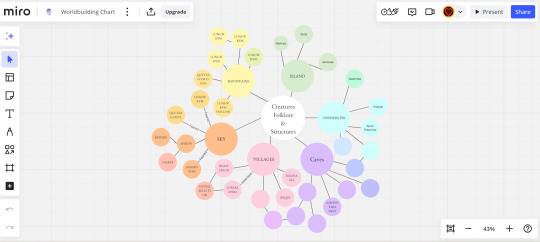
[I wrote that part weeks ago, I am now fully using Miro and believe it's the best for making timelines and charts, I just wish it let me make more boards 8/10]
Hiveword
This might be someone's jam, I can't really say it's mine though.
First off, the unpaid version is really just a few boxes saying "Write a summary here." which makes it just not worth it in my opinion
There really isn't any way to customise things which is my favorite part of most of these softwares
I've barely used this, so maybe there's something I'm missing but
1/10, Just use Google Docs at this point, here's a couple pics
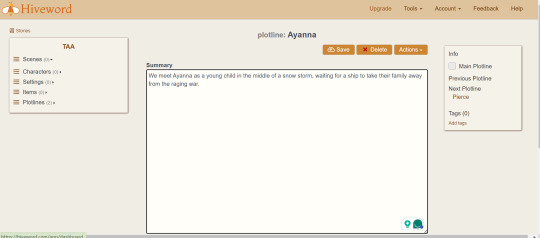

World Anvil
People like this software, it's mainly used for tabletop, which is just a different way of writing adventure, and I've seen it recommended by authors.
Unfortunately, I'm going to disagree with a lot of people and say it's hard to use and isn't even really good at plotting.
I may be biased on this one as every time I've tried to use it in the past I've struggled. However, it seems like another just write it in a document and create a folder.
I'd say it's closer to an organizing tool, but even then just use something else.
3/10, I have nothing to say about it but maybe you'll enjoy it, all here are two photos
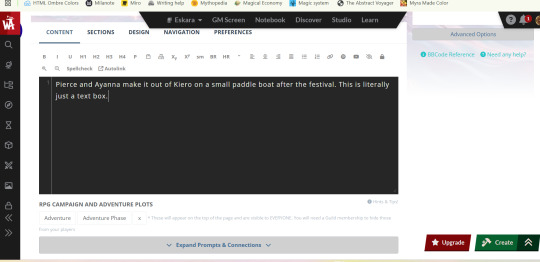

Campfire
This is the one I think I've heard the most about, but have never actually tried.
right off the bat, I'm going to say this is 100% worth it, you'll see at the end with the photos but this is like if Miro and World Anvil had an organization baby.
It's extremely easy to understand, and it makes timelines, it's more for writing your whole book but idk about that yet.
7/10, its themes are really pretty but it limits how much you can do to 20 I believe. Here are the photos
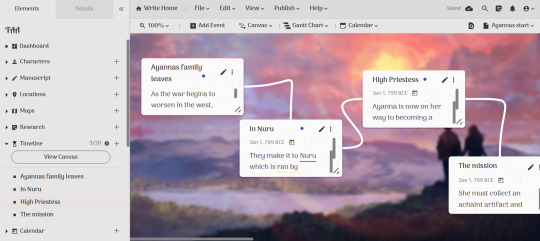
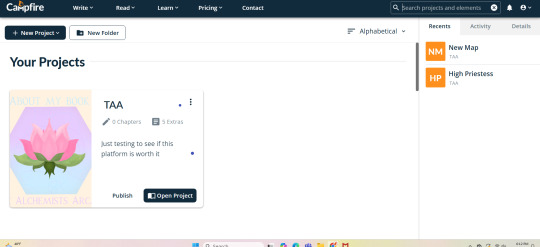
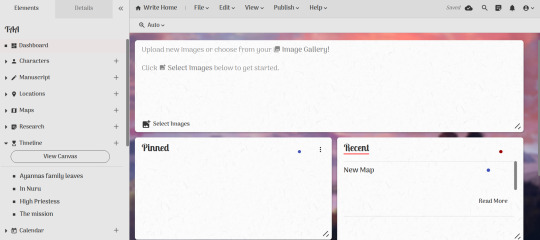
That's all for now, honestly, I think you should use Miro if you are looking to plot things out, and Milanote if you want to collect and organize your thoughts for writing, as that's what I do. Obviously what I like won't be for everyone, but hopefully, this helped you see some options
#writeblr#writers on tumblr#creative writing#worldbuilding#plotting#writing advice#writing tool#writing#writers#writing plans
1K notes
·
View notes
Text
20 Alternative Losses Your Protagonist Can Face That Don't Involve the Death of a Person.
In one of my recent posts, I talked about losses as a core principle in driving a plot forward.

It's recommended in almost all guides. But here's the thing: someone doesn't have to actually die to create that emotional rollercoaster.
Here are 20 different losses your protagonist can face without losing someone to the cold hands of death:
1. Loss of a dream job opportunity
2. End of a long-term relationship or marriage
3. Betrayal by a close friend or family member
4. Financial ruin or bankruptcy
5. Loss of a beloved pet (The pet could go missing.)
6. Rejection from a prestigious program or institution
7. Injury or illness leading to the loss of physical abilities
8. Destruction of a childhood home
9. Loss of custody of a child
10. Failure to achieve a lifelong dream or goal
11. Being falsely accused of a crime
12. Natural disaster destroying personal belongings and home
13. Loss of a valuable family heirloom
14. Experiencing discrimination or injustice
15. Being forced to move away from a beloved community
16. Losing a significant competition or contest
17. Loss of memory or cognitive abilities
18. Falling out with a mentor or role model
19. Closure of a cherished local business
20. Loss of one's reputation due to scandal or rumor
Thank you for all of your support. If you love my blog, consider gifting me a rose. Val's here, and I hope your characters are ready to paint the town red.
Check out this printable template that helps you structure the nuanced parts of your plot you normally skip out on.
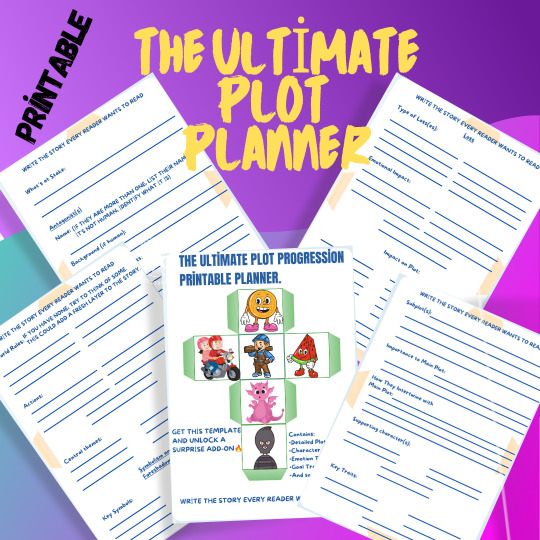
You also receive a free add-on that enhances your plot. It saves you time and helps you maintain quality.
#writeblr#writers on tumblr#writing#writers and poets#writerscommunity#writer#writing community#ao3 writer#wattpad#a03 writer#writers#writing prompts#writing guide#writing advice#writing reference#writing resources#writing habits#writing help#writing blog#writing techniques#writing template#writing tips and tricks#writing tool#writing tips#writing plot#plot problems#aspiring writer#writer and poets#writer blog#writer help
846 notes
·
View notes
Text
Okay writers listen up
I'm gonna tell you about how I wrangled my shitbird brain into being a terrifying word-churning engine and have written over 170K words in under a year.
I wanna be clear that before unlocking this Secret Technique I was a victim of my unmedicated ADHD, able to start but never finish, able to ideate but not commit and I truly and firmly believed that I'd never write a novel and such a thing was simply outside of my reach.
Now I write (and read!!) every day. Every. Single. Day. Like some kind of scriptorial One Punch Man.
Step the First
Remove friction between yourself and writing.
I personally figured out how to comfortably write on my phone which meant I didn't have to struggle with the insurmountable task of opening my laptop.
I don't care if this means you write in a Discord server you set up for yourself, but fucking do it. Literally whatever makes you write!
(if you do write somewhere that isn't a word processor PLEASE back your work up regularly!)
Step the Second
Make that shit a habit. Write every day.
For me, I allow myself the grace that ANY progress on writing counts. One sentence? Legal. Five thousand furious hyperfixated words? Also legal.
Every day, make progress. Any progress.
I deleted Twitter from my phone and did my best to replace doomscrolling with writing. If I caught myself idly scrolling I'd close whatever I was looking at and open my draft and write one (1) sentence until I made THAT a habit, too.
Step Two-point-Five
DO NOT REWRITE. If you are creating a first draft, don't back up or restart. Continous forward motion. Second drafts and editors exist. Firsts are for ripping the fucking thing out of your brain.
If you're working on revisions after an editor or beta readers or whoever has given you feedback, then you can rewrite that's OK (and it counts as your writing for the day!)
Step the Third
Now that you've found a comfortable way to write and are doing it every day, don't stop. Keep doing it. Remember, just one sentence is all you need. You can always do more, but if one lousy sentence is all you can manage then you're still successfully writing.
Remember: this is what worked for me. Try things until you find what works for you.
You can do it. I believe in you.
#am writing#writing resources#original writing#Writer#writeblr#author#Author resources#writing tools#writing#writing tool#long post#text post
5K notes
·
View notes
Text
5 Days of Helping You Outline Your Next Novel

Day 1: Benefits of Outlining Before Writing Your Book
Follow along for all 5 installments of the mini series: helping you outline your next novel

I. Clear Direction - knowing where you’re going allows you to pack the right kind of clothes, same with a novel - know where you’re going so you can bring the right stuff
II. Strong Structure - by writing an outline, you can structure your book to have a natural rise and a fall, like breathing
III. Consistency in Writing - not getting stuck with what happens next allows you to write more content more consistently
IV. Intentional Themes - by defining your story outline, you can sprinkle in some intentional symbols and themes within your writing
V. Better Character Development - knowing the overall arc of your story allows your characters to experience the moment and become who they’re meant to be. you can add in vulnerable moments, mistakes, and bad decisions to help them become the best (or worst) version of themselves
VII. Opportunities for Foreshadowing - by knowing where you’re going, you can add in witty little details of foreshadowing (ex: the mercenary had a reputation that - well, you’ll see) to string your readers along
VIII. Scene Variety - similar to pacing, scene variety can be inserted into your novel to prevent boring repetitions and keep the pov fresh and interesting
IX. Realistic Plot Lines - knowing the journey and destination before the characters do allows you to insert realistic motive and plot lines that drive your characters, instead of allowing your characters to drive the plot with unforeseen chaos (although this happens sometimes too and it’s okay!)

your reblogs help me help more ppl 💕
You can find Day 2 of this mini series [here].
follow along for writing prompts, vocabulary lists, and helpful content like this! <333
✨ #blissfullyunawaresoriginals ✨
#writeblr#writers on tumblr#creative writing#writerscommunity#fiction#character development#writing prompt#dialogue prompt#female writers#writer blog#outline#outlining#novel writing#fantasy novel#my novel#novelist#writing inspiration#fiction writing#fiction writer#indie author#ao3 writer#writing life#writers#writer#writing#writblr#writer stuff#writing tool#blissfullyunawares#blissfullyunawaresoriginals
163 notes
·
View notes
Note
Do you know a good app or any other procedure/materials where I can make a structure of my long form story? :( i basically don't know how to map it all out.
Here's a great post by @the960writers
LibreOffice (https://www.libreoffice.org/)
FocusWriter (https://gottcode.org/focuswriter/)
Scrivener (https://www.literatureandlatte.com/scrivener/overview)
Reedsy (https://reedsy.com/write-a-book)
Novelpad (https://novelpad.co/)
Campfire (https://www.campfirewriting.com/)
Obsidian (https://obsidian.md/)
Notesnook (https://notesnook.com)
Ellipsus (https://ellipsus.com)
Read their full post for more information. Hope this helps :)
#anonymous#writing app#writing tool#writing software#writeblr#writers on tumblr#writing reference#dark academia#spilled ink#creative writing#fiction#light academia#writing resources
164 notes
·
View notes
Text

I used to get stuck in the endless cycle of plotting, worrying about pacing, structure, and word count. Writing started to feel more like a chore than the creative escape it once was. That’s when I decided to ditch the stress and try something new—a method I now call The Eight Chapter Method.
It’s something I came up with after struggling to finish projects. I told myself: “What if I wrote the entire book in just eight chapters?” No strict structure. No perfect pacing. Just pure, messy storytelling.
𝕳𝖊𝖗𝖊’𝖘 𝖍𝖔𝖜 𝖎𝖙 𝖜𝖔𝖗𝖐𝖘:
💡 I cram the whole book—plot, character arcs, major moments, and even some dialogue—into eight chapters. It’s rushed, chaotic, and beautifully imperfect. But it works. I don’t worry about word count or whether everything flows seamlessly. I just write.
Once those eight chapters are done, I go back with a clearer view of the story. That’s when I start breaking down the chapters, expanding scenes, smoothing transitions, and cutting what doesn’t fit. It’s like having a rough sketch before painting the final picture.
𝑾𝒉𝒚 𝒅𝒐𝒆𝒔 𝒊𝒕 𝒘𝒐𝒓𝒌 𝒇𝒐𝒓 𝒎𝒆?
✍️ It keeps the excitement alive.
⏳ I don’t get bogged down by perfectionism.
📖 I see the whole story faster, making revisions less overwhelming.

I’m not sure if anyone else works this way, but it’s been a game-changer for me. If you’ve ever struggled with finishing drafts, I can’t recommend this enough. Just write the heart of your story, and worry about the rest later.🫀
95 notes
·
View notes
Text
smartdraw.com - A cool website I found!
I wanted to do a blueprint of a scene and searched for a free online tool. This website has more than just house plans and mind maps, and I think it could really come in handy if you want to make some settings more approachable.



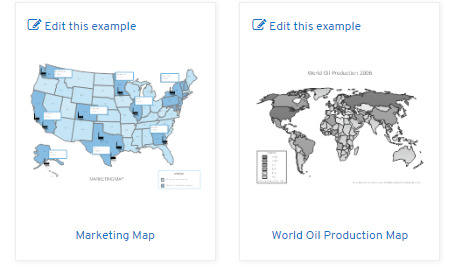
You can choose to start from scratch or use one of the many templates. The latter is probably easier in the beginning, to try out the different ways to arrange and color the objects. After getting used to the interface (it is similar to PowerPoint) you can use the result as a way to plan your scenes or give your readers a visual aid to follow the plot.
The symbols (or rather objects) for the floor plans, timelines, family trees, crime scenes etc. are sorted in many subcategories, e.g. Floor Plans -> Furniture -> Kitchen. No matter which type of diagram you pick, you can also use the objects from the others, so if you want an endoplasmic reticulum in your bathroom blueprint, go for it.

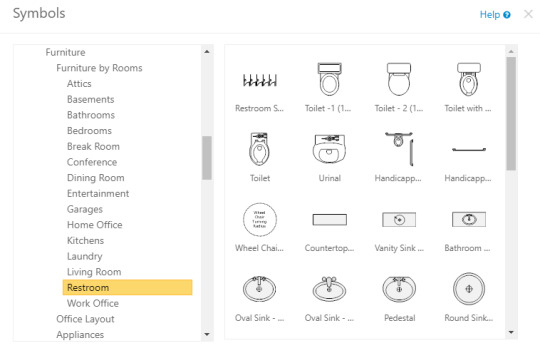
I think that for whump purposes you should especially check out the Crime Scene category for blood, drugs, weapons and so on.
I do have to say that I experienced some bugs and long loading time, but that could just be my ancient computer going wild. Also, the graphics are certainly not the prettiest. As someone who would have had to draw everything themself instead, it's still a great option.
TLDR: It's like Picrew but for locations.
#smartdraw#writing tips#writing advice#whump#whumpblr#creative writing#look at me doing free ads on here smh#i dont know why this makes me so exited lol#writing tool#design tool#free#online#i cant draw at all#this could be very useful for schoolwork too
1K notes
·
View notes
Text
#26 🌙❤️🤍
seeking help/aid
"I'm sorry to bother you but I need your help with something."
"Please, it'll just be one night, you don't have to act like it's the end of the world."
"You always ask for favors just to waste my time." / "What I'd give to have this be another playful favor."
"I'll help you with anything, that's what I'm here for." / "This time, it's not so simple..."
"I'm literally the person you hate most in this world. Why do you want my help?"
"No, I get it. There were lots of times I needed help where no one came to my aid either. It happens to everyone."
"You're just always so independent and put-together, it's weird to see you losing your shit now."
"Uh, back in the break room...was that a cry for help?"
"Haha, the last time you asked me to help you with something, I didn't leave your side for the whole day." / "It was an emergency, my god!"
"It's not my fault the grocery store shelf has better height genes than me!"
#the last one 😭#dialogue prompts#dialogue inspiration#dialogue prompt#character dialogue#writing dialogue#writing reference#writing resources#writing tools#writing tool#daily writing prompt#daily writing#whump dialogue#dialogue#dialogue ideas#dialogue writing#writing idea#writing ideas#writing prompts#writing inspiration#writing exercise#🌙❤️🤍
63 notes
·
View notes
Text
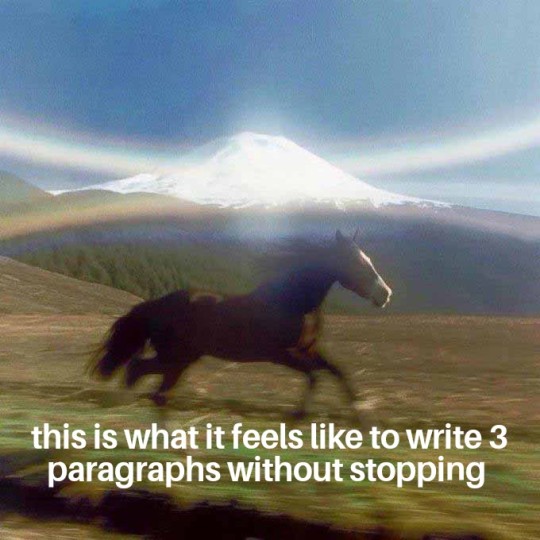
#writing#writers on tumblr#writing prompt#writers#writer#my writing#daily writing prompt#daily writing#story#writing tool#write it
140K notes
·
View notes
Note
Hi! Could I ask for some body language for general love? Like fluffy kind of love? Shy but like.. I don’t know, flustered? A little hard to describe what I mean haha
Hi Anon! I had a lot of fun with this one
Writing Fluffy/Shy Love

Body language:
Prolonged or fleeting eye contact, dilated pupils, lingering gazes at the person your character(s) interested in. As if they’re fixated on something about this person, or looking for something new about them to fixate on. (If flustered, then darting their eyes away or quickly averting their gaze if caught staring)
Fidgeting, sweaty palms, leaning in
Closeness: your characters will find any excuse to touch. Holding hands, sitting close to one another, touching knees when seated, draping arms around shoulders or legs across laps, gentle touches, playful nudges, etc. This type of physical contact is gonna be a slow burn with flustered/shy characters. For example, if they're holding hands, don't just say they are, describe them inching closer, brushing one of their fingers against the other’s palm, making eye contact. Find nonverbal cues/body language that initiates closeness.
Soft smiles, relaxed brows, attentive looks (watching the other’s hands, eyes, lips, etc)
Frequent laughter, open posture
Subconsciously mirroring the other’s body language/picking up some of each other’s mannerisms or habits without realizing it
Inner thoughts or Dialogue:
Overthinking/over-analyzing interactions between them and the one they love
Deeper concern and empathy for the person they love
More genuine interest in what the other says/does, deeper understanding/knowledge of their habits and behavior. Maybe a character loads more attention on their partner’s words/wants above their own.
Dialogue/dynamics in a couple depends on their personalities. Can be more playful/teasing with banter, passionate, casual, quiet, etc. All relationships are different from more passionate ones to companionate ones, and more.
Are both character’s flustered? Explore what it looks like when they're both hesitant or shy around each other.
If it's one flustered character, what happens when the other notices how shy they are?
General tips:
Linger more on the simplicity/normalcy of the moment. Fluff isn't dramatic twists or arguments. Cuddling while watching a movie, character A playing with character B’s hair while they do the dishes, one doting on the other when they're sick.
The tone here is going to be more cute, domestic, and comfortable.
Remember that in fluffy/shy love it's a great start to have a friendship between the characters as a foundation rather than a romance standing on its own. Why do your characters love each other? What little things do they love about each other?
should i do dialogue prompts with this or try a post diving deeper on relationship dynamics?
#writersbloxx#writers on tumblr#creative writing#writers community#writing#writers and poets#my writing#writeblr#writers block#writers blog#writers#writing tool#writing tips#aspiring author
198 notes
·
View notes
Text
When I get over this writer’s block, it’s gonna be over for all of you
#paul kinda writes#writing#poets on tumblr#writeblr#writers on tumblr#writing tool#daily writing#daily writing prompt#poems and poetry#poems and quotes#poems on tumblr#male writers#for writers#writers#writer#writing prompt#writers and poets#writerscommunity
104 notes
·
View notes
Text
If you have a friend that is struggling to write:
Put that motherfucker in their most comfortable clothes, stick them in the car with their laptop, and go for a mini road trip together somewhere in the country.
Get coffee. Stop at a middle-of-nowhere diner for food. Visit a used book store. Open Spotify and play instrumental music like popular low-fi cover songs (perfect for writing to). Make a day of driving and going nowhere somewhere far away.
Are you both writers? Take turns. Create your own writers’ retreat. Fill your day talking about story ideas or simply spend quality time in the silence filled with the clacking of keys from the passenger seat.
#writing#reading and writing#creative writing#writing community#writing tool#writing stories#writing fiction#fiction writing#creative fiction#creativity#writers community#writing and writers#writers on tumblr#writerscommunity#writer thoughts#writer stuff#writers and poets#writer problems#writer things#writers block#writerblr#writeblr#writing stuff#cozycore#writing motivation#writing inspiration#cashmere ink
69 notes
·
View notes
Text
Some ‘common’ 'British' slang phrases
Source - I’m British. Disclaimer - I’m northern..
Sling ya/your hook - get out of here. Bugger off - go away. Bugger all - nothing. Lost/loosing the plot - gone/going crazy. Off your trolley - doing something crazy. EX: You must be off your trolley if you think that’s going to work. Off your head - crazy. Have a gander - take a look/having a look. Faffing around - messing around/wasting time. Ass-over-tit - when someone falls over. ‘Effing and blinding - someone is swearing a lot. Not my/their cup of tea - something you/others don’t like. One off - one time thing. (going to) see a man about a dog - when you don’t want to tell someone where you’re going. Taking the piss - you’re shocked at a situation. EX: this train being late is taking the piss. Taking the biscuit - the SFW version of taking the piss. Speaking the queens English - to speak standard English. Sometimes this can mean someone is posh. Budge up/over - move over/ make space. Mugging me off/ mug me off - Someone is making fun/annoying you. Can’t be arsed - can’t be bothered. Don’t get your knickers in a twist - don’t get worked up. (You’re) having a laugh - you can’t be serious? Kicked the bucket - dead. Bang/well out of order - not fair. (I) don’t give a rats arse - don’t care. (that’s) thrown a spanner in the works - something has been disrupted or screw up. EX: Her moving the time of the party has really thrown a spanner in the works. In for a penny, in for a pound - you’ve started something you might as well finish it. Nip in/out - Quickly go somewhere. EX: I’m just going to nip to the shop. Bob’s your uncle - There you go. On your bike - fuck off/go away. Blues and two’s - emergency vehicle’s/lights. It’s been donkeys (years) - It’s been a long time. (I think this is a very northern way of saying it, you would normally say; It’s been donkeys years since I have seen her.) Give over - stop it Bit nippy - bit cold Oh my giddy aunt - oh my gosh It’s a bomb site - It’s a mess It's a pig sty - it's a mess Lose your rag - getting angry EX: I'm going to lose my rag if you keep doing that Trollop - idiot EX: he’s an absolute trollop Blager - showoff, fake. EX: He’s just a blager Gaff - House Cocker - mate EX: yes me old cocker? Sod off - go away Cheers-big-ears - cheers (when drinking)
_NEW ADDITIONS_
Spend(ing) a penny - going to the toilet Blighty - Britain Gaffer - boss Tosser - Dickhead Scran - food Cheap as chips - somethings cheap (chips=fries) Happy as larry - very happy. Rozzers - police Doing a legger - running away (Me) bollocks - not real. EX: It’s a mile away me bollocks Spitting image - double of someone. EX: He’s the spitting image of his mum Off his/her rocker - crazy (Plat) Plaiting hair - Braid/braiding hair Tea leaf - snitch Slag (him) off - talk bad about someone. Toerag - problem causer Git - annoying person. “You cheeky git, how dare you.” In the buff - naked
Bonus It’s pissing/chucking it down - it’s raining fucking hard.
I have beef with this one… Ruined my experience when I played through Alone in MW2. Even with his accent Simon would have known what Johnny meant when he said ‘it’s pissing it down’ it’s such a common phrase especially in the north.
I literally hear and use it myself almost daily and I don’t even live in the UK. Simon would have known, he’s from Manchester for Christs sake. Anyway that dialog pisses me off.
299 notes
·
View notes
Text
How to Stay Motivated as a Writer.
I ran a poll to celebrate reaching 50 reblogs because you guys are amazing, and this topic won the poll.
(This is a bit lengthy, but I advise you to read to the very end. These are the kind of tips you rarely find without a fee, but for your amazing support so far, you get this from me for free.)
Let's dive in!
Before I became a writing coach, lack of motivation was something I battled with. Writing started to feel like a waste of my time, but whenever I stopped, I still found my way back somehow.
After a few more months of struggling and finding a clear routine that worked for me, I became a writing coach. Believe me when I say that it was such a commitment, and you'd never know until you get your first student.
I only knew how to stay motivated as an individual. After two students, I realized that motivation was also something they struggled with, and as their coach, it became my duty to offer solutions. In fact, nine out of ten writers struggle with this same problem, so I came up with the 'why and what' technique.
What is the 'why and what' technique?
This technique is a template to figure out the main reason a writer isn't motivated at the current time, which allows for the provision of tailored and personalized solutions to solve the specific problem. In other words: Understanding the why (the main reason for the lack of motivation at the time) to figure out the what (effective solution to solve the main reason).
Lack of motivation is pretty subjective and varies widely. Giving a particular piece of advice may work for some and not for others, which is why I ensured my technique benefits all.
I'll give examples of common reasons writers lack motivation for writing using the template. If you don't find any that relate to you, write it in the comments and get a personalized solution from me.
1. Lack of Inspiration
Why:
- Feeling uninspired by current projects.
- Overwhelmed by the vastness of ideas.
- Stuck in a creative rut.
What:
- Change your environment: Sometimes a new setting can spark creativity. Try writing in a different location, like a park or a café.
- Consume creative content: Read books, watch movies, or listen to music that inspires you.
- Engage in Free Writing: Set a timer for 10 minutes and write whatever comes to mind without worrying about structure or grammar.
- Take a step back: You are no less of a writer if you decide to take a break and watch other writers from afar. Personally, it's difficult to write when I'm not inspired. I find myself editing more than usual and, at times, discarding the piece I spent hours on. So for a little while, I only engaged online and learned other ways to improve my skills with the time on my hands.
2. Fear of Failure
Why:
- Worrying that your writing isn't good enough.
- Comparing yourself to other writers.
- Fear of negative feedback.
What:
- Set small goals: Break down your writing project into manageable tasks to avoid feeling overwhelmed.
- Seek constructive feedback: Share your work with trusted friends or writing groups who can provide supportive and constructive criticism.
- Celebrate small wins: Acknowledge and celebrate your progress, no matter how small. Always remember that our writing styles differ from one another, and that is what makes us unique as writers.
3. Lack of Time
Why:
- Busy schedules and other commitments.
- Difficulty prioritizing writing.
What:
- Create a writing schedule: Dedicate specific times in your day or week for writing and stick to it.
- Use writing prompts: Short prompts can help you get started quickly and make the most of limited time.
- Eliminate distractions: Find a quiet space and turn off notifications to focus solely on writing.
- Create or join writing challenges: Activities like the 3-day writing challenge, writing a novel in 6 months, the 7-day character creation challenge, the fantasy writers challenge, etc., have specific guidelines tailored to helping writers stay motivated and at the same time productive in limited times.
4. Perfectionism
Why:
- Striving for perfection in every sentence.
- Reluctance to move forward until everything is perfect.
What:
- Embrace the draft: Accept that your first draft doesn't have to be perfect. Focus on getting your ideas down first.
- Set time limits: Give yourself a set amount of time to write and then move on, even if it's not perfect.
- Practice self-compassion: Remind yourself that it's okay to make mistakes and that writing is a process.
-Listen to writing podcasts or join a valuable writing newsletter: You will learn more about the writing industry and writing processes of other established writers, their wins, struggles, difficulties, appreciations, etc., which can serve as an assurance that you are facing the processes of a typical writer.
Here's a podcast and newsletter for writers I totally recommend—The Shit No One Tells You About Writing. You can listen to The Shit No One Tells You About Writing on platforms like Apple Podcasts and Spotify or sign up for their newsletter.
5. Burnout
Why:
- Writing too much without breaks.
- Feeling exhausted and mentally drained.
- Stressed out from other engagements
What:
- Take regular breaks: Schedule breaks during your writing sessions to rest and recharge.
- Engage in other hobbies: Spend time on activities you enjoy outside of writing to refresh your mind.
- Practice mindfulness: Techniques like meditation or deep breathing can help reduce stress and improve focus.
- Listen to music: It's an amazing mind therapy.
6. Lack of Support
Why:
- Feeling isolated in your writing journey.
- Lack of encouragement from others.
What:
- Join writing communities: Connect with other writers through online forums, local writing groups, or social media.
- Find a writing buddy: Partner with another writer to share progress, provide feedback, and offer mutual support.
- Attend workshops and events: Participate in writing workshops, conferences, or webinars to learn and network with others.
- Get a writing coach: Find a coach that will dedicate their time assisting you through your writing processes.
7. Working on Too Many Drafts Simultaneously
Why:
- Overwhelmed by multiple projects.
- Difficulty prioritizing which story to focus on.
- Constantly switching between drafts, leading to a lack of progress.
What:
- Prioritize projects: Choose one or two main projects to focus on and set the others aside temporarily. This helps you concentrate your efforts and make significant progress.
- Create a project schedule: Allocate specific times or days for each project. For example, work on one story in the mornings and another in the afternoons.
- Set clear milestones: Break each project into bit-sized, manageable tasks with deadlines. Celebrate when you reach these milestones to stay motivated.
- Limit new ideas: Keep a notebook or digital file for new ideas, but resist the urge to start new projects until you complete your current ones.
- Use a timer: Work on one project for a set amount of time (e.g., 25 minutes using the Pomodoro Technique) before taking a break or switching to another task.
8. Frustration of Not Completing Any Stories
Why:
- Feeling stuck or losing interest in projects.
- Perfectionism preventing you from finishing.
- Lack of a clear plan or direction.
What:
- Set realistic goals: Define what "completion" means for each project (e.g., finishing a first draft, reaching a certain word count) and work towards that.
- Embrace imperfection: Accept that your first draft doesn't have to be perfect. Focus on getting the story down, and you can revise it later.
- Find accountability: Share your goals with a writing buddy or group who can help keep you on track and provide encouragement.
- Reward yourself: Plan small rewards for completing sections of your work. This can be anything from a favorite snack to a relaxing activity.
- Reflect on your progress: Regularly review what you've accomplished to remind yourself of your progress and stay motivated.
- Set a clear outline for your story: Having a clear and detailed outline for a story makes it difficult to run out of ideas.
- Share your achievements with others: Achievement posts are one of the posts that receive more engagement from people. I'm quite aware of Substack. The notes with the highest engagement have to do with achievements. People find those notes empowering and inspiring. Share your wins with others and let them celebrate with you.
9. Working on Too Many Drafts
Why:
- Perfectionism leading to endless revisions.
- Difficulty deciding when a draft is "good enough."
- Fear of publishing an imperfect work.
What:
- Set a draft limit: Decide on a maximum number of drafts (e.g., three to five) before moving on to the next stage.
- Establish clear goals for each draft: Define what you want to achieve with each draft (e.g., plot consistency, character development, grammar).
- Seek external feedback: Get input from beta readers or a professional editor after a set number of drafts to gain fresh perspectives.
- Create a timeline: Set deadlines for each draft to avoid getting stuck in a cycle of endless revisions.
10. Trying to Earn with Your Writing
Why:
- Financial pressure to monetize your writing.
- Balancing creative passion with commercial viability.
- Navigating the competitive market.
What:
- Diversify income streams: Explore various ways to earn from your writing, such as freelancing, self-publishing, blogging, or offering writing services.
- Build an online presence: Use social media, a personal blog, or platforms like Tumblr, TikTok, and Instagram to showcase your work and connect with potential readers and clients.
Remember, If you don't find any that relate to you, write it in the comments and get a personalized solution from me.
- Offer exclusive content: Create special content or giveaways for your audience to increase engagement and loyalty.
- Learn marketing skills: Invest time in learning about book marketing, SEO, and social media strategies to effectively promote your work.
- Network with other writers: Join writing communities and attend workshops or conferences to learn from others and find opportunities for collaboration.
Remember, If you don't find any that relate to you, write it in the comments and get a personalized solution from me.
Reblog to save for later 😉. Once again thank you for supporting my blog!
#writing#writers on tumblr#writeblr#writers and poets#writing community#writerscommunity#ao3 writer#wattpad#a03 writer#writer#writing tips#writing stuff#creative wrting#on writing#creative writing#writing advice#motivation#writers#writing struggles#writing strategies#writing style#writing stories#story writing#writing snippet#writing tool#writing techniques#writing template
91 notes
·
View notes